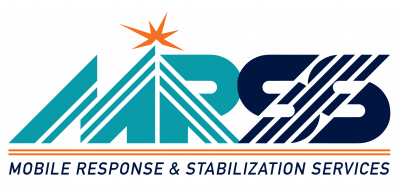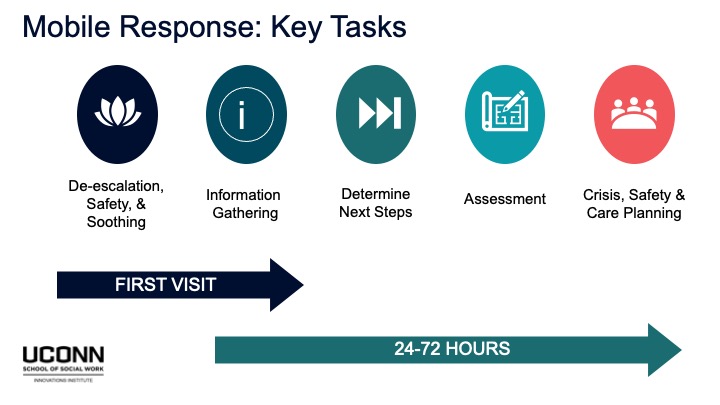
Mobile Response & Stabilization Services

Mobile Response and Stabilization Services (MRSS) is our crisis intervention model, which emphasizes the need to respond with urgency to the immediate needs of children, youth, young adults, and their caregivers. The model offers rapid response and intervention to help stabilize families with youth experiencing behavioral health challenges and prevent further escalation or harm.
If you or someone you know is experiencing a behavioral health crisis or needs immediate emotional support you can call or text 988 to reach the national 988 Suicide and Crisis Lifeline. Counselors are available 24 hours a day, every day.
Our Publications

Key Features of the MRSS Model
- Mobile Rapid Response: Trained staff, such as peers, social workers, or counselors, respond quickly to families when they call for help. They assess the immediate needs of the child and caregivers and provide appropriate interventions to ensure safety and stability.
- 24/7 Availability: Services are often available around the clock, including evenings, weekends, and holidays, to address crises whenever they occur.
- Mobile Support: Mobile response teams offer support directly in the family's home or another community setting, helping where it is needed most to de-escalate behavioral health crises in a familiar environment.
- Assessment and Referral: Staff assess the behavioral health needs of the youth, and the family's circumstances to determine the appropriate level of support. They may offer referrals to other services or resources for ongoing support and assistance.
- Short-Term Stabilization: The primary goal of MRSS is to stabilize the immediate crisis, ensuring the safety of the child and family members. This involves implementing coping strategies, developing safety plans, or providing temporary interventions until longer-term support can be arranged.
- Collaboration with Other Providers: MRSS teams often work closely with other community-based services, including mental health agencies, schools, hospitals, and law enforcement, to coordinate care and ensure continuity of support for the child and family.
- Individualized and Family-Centered Approach: Services are tailored to the specific needs and preferences of the family, with a focus on empowering parents and caregivers to effectively manage crises and support their child's well-being.
Overall, MRSS play a crucial role in providing timely and effective support to families facing behavioral health challenges, helping to prevent crises from escalating and promoting the overall health and stability of children and their families.


What We Do
We provide comprehensive support for the installation of MRSS, encompassing everything from system design and implementation to capacity building and practical skill application within your workforce. Whether you're embarking on the initial stages of MRSS implementation or refining existing youth crisis services, our expertise can be your guiding light. With an in-depth understanding of proven best practices, we stand ready to elevate outcomes for children, young people, and families alike. Leveraging the latest insights from implementation science, we craft innovative strategies to drive systemic reform and elevate practice standards, ensuring lasting transformation and measurable success.
Readiness Analysis
We have developed several tools to assist states, localities, and organizations in assessing and developing readiness for MRSS implementation and reform. Readiness assessment can be provided as a standalone consulting agreement or may be part of larger technical assistance package, including training and coaching on MRSS best practices.
By completing both the System Level - Payor Scan and the Practice Level - Provider Scan, we identify opportunities for advancement. This includes a comparative analysis of current provider practices against established payor standards, as well as a comprehensive assessment of system support and provider practices against MRSS best practices. Through this dual approach, we unearth potential drivers of variance and develop a robust technical assistance plan tailored to your unique needs, identifying trends, areas of strength, and actionable steps to propel you towards your goals with confidence and clarity.
MRSS Environmental Scan
Tailored to provide a comprehensive overview, our MRSS Environmental Scan serves as a strategic lens, meticulously evaluating the landscape of children's crisis services within a defined area or population. Through this process, we delve deep to assess the current scope, reach, and effectiveness of existing approaches and services, scrutinizing their adherence to best practices, sustainability, and capacity to meet evolving needs. The resulting report is a roadmap, illuminating the structures and design elements of the current system while identifying strengths and pinpointing critical gaps in programming at the local, regional, and state levels. Although not intended as a fiscal analysis tool, the insights garnered from this scan serve as a catalyst, guiding informed decisions regarding financing, installation, and implementation efforts, paving the way for impactful and sustainable change.
Payor Scan (System Level)
- Identification and review of contracts, policies, manuals, and regulations related to MRSS
- Identification of current children crisis services funding mechanisms and authorities
- Identification of current children’s crisis providers to be included in Practice Level
- Review of identified payor and system documents for comparison to MRSS best practice standards
-
Provider Scan (Practice Level)
- Structured interviews with all providers identified through the System Level Scan
- Analysis and comparison of current practices to MRSS best practices
MRSS System Readiness Tool (SRT)
Designed to:
- Help system leaders assess system readiness
- Proactively prioritize indicators known to be associated with modern systems design and improved outcomes for identified populations
SRT indicators are a mix of evidenced-based standards (e.g., response times), expert application of evidence-based tenets that incorporate state/local context and experiences, and voiced youth and family preferences. Use of the SRT is an evidence-informed approach to system installation of MRSS that is adaptable and accounts for the complexities of behavioral health care delivery. Implementation science and care pathway frameworks are foundational to the SRT.

System Level
Payor Scan
- Identification and review of contracts, policies, manuals, and regulations related to MRSS
- Identification of current children crisis services funding mechanisms and authorities
- Identification of current children’s crisis providers to be included in Practice Level –
Provider Scan
- Review of identified payor and system documents for comparison to MRSS best practice standards.
Practice Level
Provider Scan
- Structured interviews with all providers identified through the System Level Scan
- Analysis and comparison of current practices to MRSS best practices
By completing both the System Level - Payor Scan and the Practice Level - Provider Scan, we identify opportunities for advancement. This includes a comparative analysis of current provider practices against established payor standards, as well as a comprehensive assessment of system support and provider practices against MRSS best practices. Through this dual approach, we unearth potential drivers of variance and develop a robust technical assistance plan tailored to your unique needs, identifying trends, areas of strength, and actionable steps to propel you towards your goals with confidence and clarity.
MRSS System Readiness Tool (SRT)
Designed to:
- Help system leaders assess system readiness
- proactively prioritize indicators known to be associated with modern systems design and improved outcomes for identified populations
SRT indicators are a mix of evidenced-based standards (e.g., response times), expert application of evidence-based tenets that incorporate state/local context and experiences, and voiced youth and family preferences. Use of the SRT is an evidence-informed approach to system installation of MRSS that is adaptable and accounts for the complexities of behavioral health care delivery. Implementation science and care pathway frameworks are foundational to the SRT.
Training & Coaching: MRSS Best Practices Curriculum

Investing in the development and empowerment of our workforce stands as a cornerstone of success for MRSS, essential for enhancing outcomes and fostering resilience among families facing crises. Through our meticulously crafted training and coaching program, we not only translate evidence-informed principles and best practices into actionable strategies but also embed continuous quality improvement (CQI) aspects to ensure ongoing refinement and optimization. By systematically integrating feedback loops and performance metrics, we cultivate a culture of learning and adaptation, enabling our workforce to evolve alongside the ever-changing landscape of the crisis continuum. Central to our approach is the integration of FOCUS, an Evidence Informed Practice (EIP) developed by Innovations Institute, which is a time-limited intermediate care coordination model. Together, these components form a dynamic framework aimed at fostering seamless transitions and building robust support networks within the community. By prioritizing proactive interventions and bolstering connections with community-based resources, we strive to reduce system involvement and mitigate crisis events, ultimately paving the way for lasting positive outcomes and strengthened familial resilience.
Training and coaching occurs both on site and virtually, and across multiple settings including supervisory and document review sessions and community settings. Coaching focuses on building a core set of skills needed to support quality practice. Our coaching is supported by Practice Improvement Tools and provided through our virtual coaching platform InnovatePractice©.
Training Curriculum
Online Offerings
Orientation to MRSS – 3 Modules
This training series is designed to guide participants through the basic principles and components of MRSS. Module 1: A Critical Component in Modern Systems Design contextualizes MRSS as part of larger state health reform and a necessary component of a robust and comprehensive system design. Module 1 is a pre-requisite to attending the Introduction to MRSS Practice and/or the Accessing MRSS trainings. Module 2: MRSS Principles and Service Components defines a best practice MRSS model and, in combination with Module 3: Accessing MRSS, can replace or supplement the live one-day Accessing MRSS training in states where access point workforce size or shift patterns make the live training option prohibitive.
Crisis Planning – 3 Modules
This training series is designed as a booster to crisis planning training following completion of the 3-day MRSS: Introduction to Practice Training. Over a series of 3 modules, participants’ understanding of crisis planning is reinforced and enhanced. Concepts covered include defining and responding to crisis versus safety; the crisis cycle; proactive and reactive planning; trauma-responsive planning and creating and implementing the plan.

Core Trainings
MRSS: Introduction to Practice (3-day)
Provided for all staff expected to practice or supervise mobile response and stabilization activities. Through attendance at this training, participants will be able to:
- Define Mobile Response and Stabilization Services.
- Explain the principles of a quality MRRS model.
- Demonstrate the core components of the MRSS model and best practice approach for MRSS implementation.
MRSS: Across Settings and Populations (2-day)
Provided for all staff expected to provide or supervise mobile response and stabilization activities. As a prerequisite, staff will have completed the 3-Day MRSS: Introduction to Practice training. Through attendance at this training, participants will be able to:
- Examine MRSS Model Design elements emphasizing universal, community-based access.
- Summarize populations likely to access MRSS and the necessary skills and knowledge to support them.
Supervision in MRSS/Practice Improvement Tools in MRSS (2-day for sups/coaches only)
Provided for supervisors and coaching candidates of MRSS. This training may consist of two, one-day modules or may be offered in full as a 2-day training depending on the system-identified needs and preferences. Through attendance at this training, participants will be able to:
- Explain connections between implementation science and the role of the supervisor
- Practice value-rooted supervision responses for key tasks within MRSS service components
- Identify and define tools available to support the supervisory process
- Identify potential trouble spots/value breakdowns for key tasks within the MRSS service components
Supplemental Trainings
Accessing MRSS (1-day)
Provided for all staff expected to practice or supervise access point activities. Through attendance at this training, participants will be able to:
- Explain the principles of a quality MRSS model.
- Distinguish between children, youth and family crisis systems and adult response models.
- Identify the core components for the MRSS model and demonstrate the best practice approach for MRSS implementation within access points.
- Apply understanding of a high quality MRSS model in triage practices including differentiating between adult-driven and child-driven practices and describing the critical vs. noncritical information necessary for warm hand-off to mobile teams.
MRSS: Understanding Trauma (1-day)
May be provided for all staff implementing or supervising mobile response and stabilization activities. An optional booster training, this training can be tailored to meet specific system-identified needs pertaining to trauma-informed care. Through attendance at this training, participants will be able to:
- Understand the impact of trauma experiences on a youth’s development, behavior, and emotional responses as well as the long-term effects on physical and mental health through adulthood.
- Recognize the importance of trauma-informed practices in improving engagement and collaboration with youth and families.
- Identify trauma-informed responses to behavior.
*May be a 2-day training in combination with crisis planning, below*
Crisis Planning in MRSS (1-day)
May be provided for all staff implementing or supervising mobile response and stabilization activities. An optional booster training, this training can be tailored to meet specific system-identified needs pertaining to crisis planning. Through attendance at this training, participants will be able to:
- Understand the difference between safety and crisis and differentiate effective responses for each.
- Understand the crisis cycle.
- Demonstrate how to create, monitor, and adjust individualized and effective crisis plans.
- Through a trauma-informed lens, identify crisis plan components that build on the strengths, skills, and resources of families and youth.
*May be a 2-day training in combination with Understanding Trauma, above*
Engagement in MRSS (1-day)
Provided for all staff expected to practice or supervise mobile response and stabilization activities. Through attendance at this training participants will be able to:
- Identify and understand barriers to engaging with children and families.
- Develop skills around engaging the family, natural supports, and community resources.
- Utilize and practice evidence-based strategies of engagement for increased positive outcomes for youth and their families.
Intermediate MRSS Practice Training (2-day)
Provided for all staff expected to practice or supervise mobile response and stabilization activities. Intermediate practice trainings are individualized to the needs of the local coaching candidate’s state or community. Coaching candidates may assist in training development using data to inform course content decisions. Potential areas of focus include engagement, safety, crisis, and care planning, and assessment and monitoring. Through attendance participants will be able to:
- Deepen and integrate understanding of MRSS principles and skills into practice.
- Evaluate current practices against MRSS best practice model and identify areas for change.
- Address barriers and support pathways for practice improvement.

Capacity Building: Certification of Local Coaches & Trainers
We provide states, localities, and organizations with MRSS Practitioner Certification for locally identified coaching candidates and selected supervisors. The certification program provides local staff with the necessary support and training to sustain high-fidelity and quality MRSS implementation across child-serving systems within their state, locality, or organization. There are three levels/types of certifications, each individualized and dependent on state and organizational structures and need.
Local Coach Certification
- Local Coach Certification typically focuses on developing individuals who can provide coaching and support at a state, local, or organizational level.
- These certifications often emphasize the mastery of coaching techniques, interpersonal skills, and the ability to facilitate learning and growth among all levels of practitioners in achieving their goals and improving performance.
Trainer Certification
- Trainer Certification is geared towards individuals who are proficient in delivering training sessions or workshops on specific topics or skills.
- These certifications often involve mastery of instructional design, delivery techniques, and facilitation skills to effectively convey information and facilitate learning experiences.
- Trainers may deliver training sessions to various audiences, including internal staff, practitioners, or external stakeholders, depending on the state’s needs and objectives.
Supervisor Certification
- Supervisor Certification typically focuses on developing individuals who are frontline practitioners of the model with responsibilities for overseeing and managing teams or departments.
- These certifications often include training and assessment of model understanding, leadership skills, performance management, conflict resolution, and team building.
- Supervisors may be responsible for guiding and supporting their team members, setting performance expectations, providing feedback, and ensuring the overall effectiveness and productivity of their team.